The human brain, a marvel of complexity and function, requires proper nourishment for optimal performance and longevity. Among the plethora of dietary choices available, fruits stand out for their rich array of nutrients, offering a natural and delicious way to support brain health. This blog post delves into a selection of fruits that are particularly beneficial for the brain, highlighting their unique properties and the ways in which they contribute to cognitive well-being. From the antioxidant-rich raspberries to the fatty acid-laden avocados, each fruit discussed provides a unique set of benefits that can help in maintaining and enhancing brain function.
Raspberries

Raspberries are a powerhouse of nutrients, offering a rich blend of vitamins, minerals, and antioxidants that are essential for brain health. These berries are particularly high in flavonoids, compounds known for their potent antioxidant properties. Antioxidants play a critical role in neutralizing free radicals, protecting brain cells from oxidative stress, and potentially slowing down age-related cognitive decline. Additionally, raspberries contain a good amount of Vitamin C and fiber, both of which are beneficial for overall health, including the brain. The fiber in raspberries aids in maintaining stable blood sugar levels, which is crucial for sustained brain function and mood regulation.
The specific impact of raspberries on cognitive abilities is also noteworthy. Regular consumption of these berries has been linked to improved memory, attention, and motor skills. Studies suggest that the phytonutrients present in raspberries can enhance neuroplasticity, the brain’s ability to form new connections and pathways, thus supporting learning and memory processes. Moreover, raspberries possess anti-inflammatory properties, which may reduce the risk of neurodegenerative diseases like Alzheimer’s. The inclusion of raspberries in one’s diet offers a delicious and nutritious way to support brain health and cognitive function.
Avocados
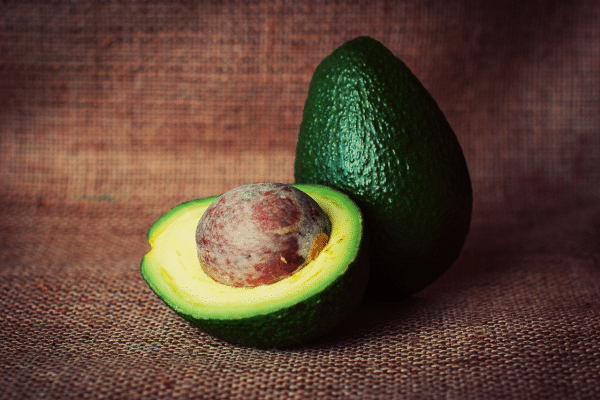
Avocados are celebrated for their high content of healthy monounsaturated fats, which are vital for brain health. These fats contribute to the formation of myelin, the sheath that covers nerve cells and aids in the efficient transmission of electrical signals in the brain. This is crucial for maintaining cognitive speed and clarity. Furthermore, the fats in avocados support the absorption of fat-soluble vitamins, which are essential for brain health. Avocados are also a good source of Vitamin E, an antioxidant that has been shown to protect brain cells from oxidative stress and reduce the risk of cognitive decline as people age.
Beyond their healthy fats, avocados are rich in folate and vitamin K, both of which are important for brain function. Folate has been linked to maintaining cognitive function and reducing the risk of depression, while vitamin K plays a key role in managing inflammation and supporting brain cell growth. Studies have shown that regular consumption of avocados can lead to better performance on cognitive tests, particularly in areas such as memory and concentration. This makes avocados not just a tasty addition to meals, but also a brain-boosting food that can significantly contribute to mental clarity and long-term brain health.
Pomegranate
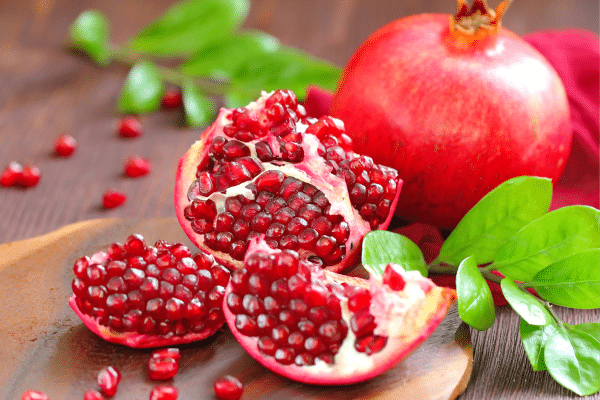
Pomegranate is another fruit that stands out for its brain health benefits, primarily due to its high concentration of antioxidants. These antioxidants, including punicalagin and tannins, are highly effective in fighting oxidative stress, a key factor in the aging process of the brain. By combating oxidative damage, pomegranates help in maintaining the health and functionality of brain cells. Additionally, these fruits are known for their anti-inflammatory properties, which further contribute to neuroprotection and the prevention of cognitive decline. Pomegranates also stimulate the production of nitric oxide, improving blood flow to the brain, which is essential for optimal brain function and cognitive abilities.
Research has shown that pomegranates can have a positive impact on memory performance and the ability to perform cognitive tasks. Regular consumption of pomegranate or its juice has been associated with improved verbal and visual memory. Moreover, the compounds in pomegranate have been studied for their potential in reducing the risk of Alzheimer’s disease and other neurodegenerative conditions. By incorporating pomegranates into the diet, one can enjoy not only a delicious fruit but also a food that actively supports brain health and cognitive function.
Oranges
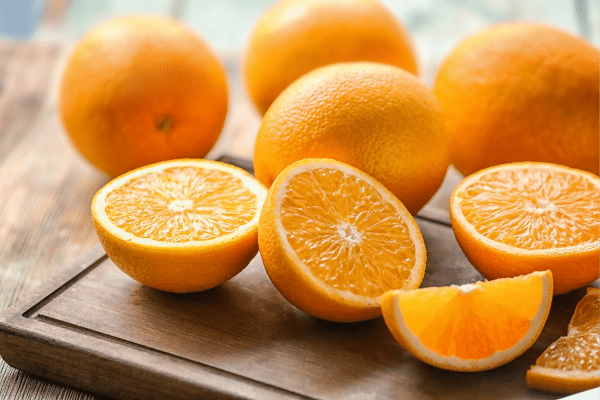
Oranges, renowned for their high Vitamin C content, are extremely beneficial for brain health. Vitamin C is a powerful antioxidant that helps in defending the brain against free radical damage. This vitamin is also essential for the repair and maintenance of brain tissue, and it plays a key role in the synthesis of neurotransmitters, which are critical for brain communication. The regular intake of Vitamin C-rich foods like oranges is associated with a lower risk of mental decline and supports overall brain health. Additionally, oranges contain folate and flavonoids, which have been shown to enhance cognitive functions and promote brain health.
Oranges also offer neuroprotective benefits. Studies suggest that the flavonoids in oranges may help in preventing neurodegenerative diseases by reducing inflammation and supporting the overall health of brain cells. The regular consumption of oranges has been linked to improvements in cognitive function, especially in older adults, and may play a role in slowing down the progression of age-related cognitive disorders. By including oranges in one’s diet, one can benefit from these various brain-boosting properties while enjoying a refreshing and nutritious snack.
Tomatoes

Tomatoes are a valuable brain food, largely due to their high lycopene content. Lycopene, a potent antioxidant, helps in protecting brain cells from damage caused by free radicals. This is particularly important in reducing the risk of developing neurodegenerative diseases like Alzheimer’s and Parkinson’s. Tomatoes also contain folic acid and vitamin K, which are essential for brain health. Folic acid aids in the prevention of age-related cognitive decline, while vitamin K is involved in sphingolipid metabolism, a crucial process for brain cell maintenance.
The benefits of tomatoes for the brain extend beyond their antioxidant properties. They are also a source of choline, a nutrient that plays a vital role in brain development and the production of neurotransmitters. Choline is essential for memory and learning functions, and its deficiency has been linked to neurological disorders. Regular consumption of tomatoes, therefore, not only provides essential nutrients for the brain but also supports cognitive functions such as memory and concentration, making them an important part of a brain-healthy diet.
Cherries
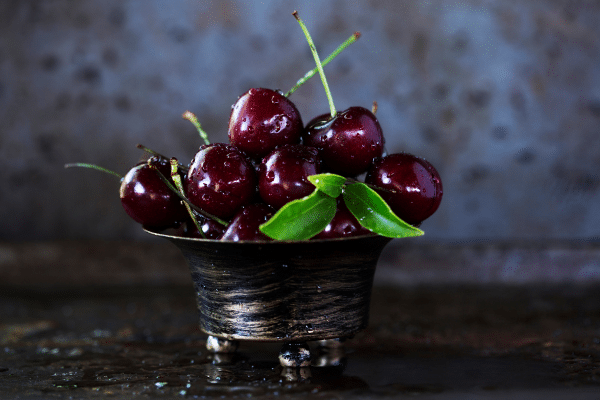
Cherries are not only delicious but also provide substantial benefits for brain health. They are rich in antioxidants like anthocyanins and cyanidin, which are known for their neuroprotective effects. These compounds help in reducing inflammation and oxidative stress, both of which are implicated in cognitive decline and various brain diseases. Additionally, cherries have been shown to improve sleep quality due to their natural content of melatonin, a hormone that regulates sleep cycles. Good sleep is crucial for brain function, as it is during sleep that the brain consolidates memories and clears out toxins.
The anti-inflammatory properties of cherries are particularly beneficial in protecting the brain. Chronic inflammation is a known risk factor for neurodegenerative diseases, and the anti-inflammatory compounds in cherries can help reduce this risk. Studies have also indicated that regular cherry consumption can enhance cognitive functions and may play a role in preventing memory loss. By including cherries in the diet, one can enjoy a tasty fruit while also supporting brain health and cognitive function.
Apples
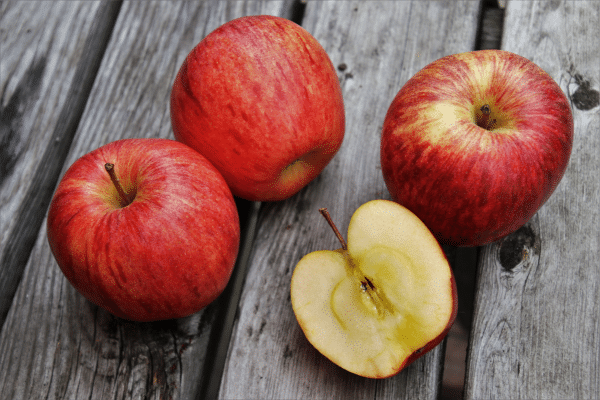
Apples are a widely popular fruit and a great addition to a brain-healthy diet. They contain quercetin, an antioxidant that protects the brain cells from oxidative stress and inflammation, two factors that can lead to cognitive decline. Quercetin also has the ability to foster the growth of new neurons and improve neuroplasticity, which is crucial for learning and memory. Besides quercetin, apples are rich in vitamins, like Vitamin C, and minerals, such as potassium and boron, which are essential for maintaining overall brain health and function.
The benefits of apples for brain health extend to their potential in preventing age-related cognitive decline. Research suggests that the regular consumption of apples can slow the progression of neurodegenerative diseases like Alzheimer’s and Parkinson’s. The fiber in apples also contributes to overall health, including stable blood glucose levels, which is important for consistent brain functioning. Apples, with their combination of nutrients, antioxidants, and fiber, are not just a healthy snack but also a smart choice for maintaining and enhancing cognitive abilities.
The Bottom Line
In conclusion, the brain thrives on a diet rich in fruits, each offering unique benefits. Raspberries, avocados, pomegranates, oranges, tomatoes, cherries, and apples are just a few examples of fruits that can significantly contribute to brain health. Their combination of antioxidants, vitamins, and minerals plays a crucial role in protecting the brain from oxidative stress, inflammation, and age-related decline. By incorporating these fruits into a regular diet, one can enjoy a delicious way to support cognitive functions and overall brain health. This simple dietary choice can have profound effects on maintaining a sharp, healthy brain throughout life.


